The Economist
Killings and Claims of an Attempted Coup Rock Ethiopia
A YEAR AGO, on June 23rd 2018, Ethiopia’s newly-inaugurated prime minister, Abiy Ahmed, took to the podium wearing a bright green T-shirt. Smiling and waving he offered hope to the tens of thousands of people who had flocked to a rally in the capital, Addis Ababa, in support of his promise to bring democracy to a country that has seen precious little of it.
Almost to the day a year later he again addressed the nation, this time on national television wearing army uniform to declare, stony faced, that his government had just thwarted a coup. It was a sharp reminder of the fragility of his democratic revolution.

—
Related:
An Emotional Memorial for Slain Military Chief in Ethiopia
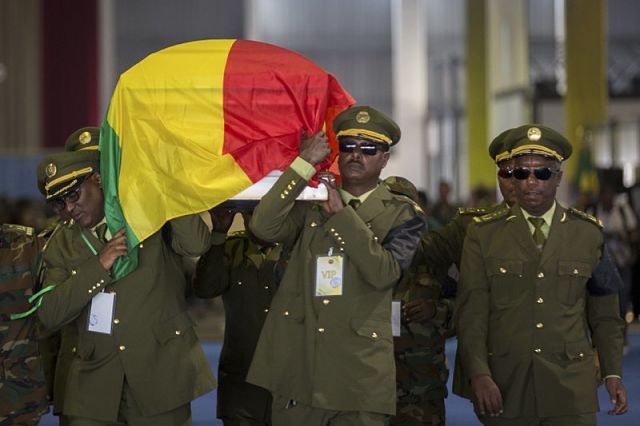
The coffin of assassinated army chief Gen. Seare Mekonnen is taken away for burial after a state ceremony at the Millennium Hall in the capital Addis Ababa, Ethiopia Tuesday, June 25, 2019. (AP Photo/Mulugeta Ayene)
By ELIAS MESERET and ANDREW MELDRUM
UPDATED: JUNE 25TH, 2019
ADDIS ABABA — Ethiopia’s Prime Minister Abiy Ahmed sobbed openly at a service Tuesday for the country’s military chief who was assassinated by his bodyguard over the weekend.
Abiy’s sweeping reforms since his election last year have been threatened by two violent attacks on Saturday in which the army chief and a retired general were killed in Addis Ababa and three regional officials were killed in Amhara province, north of the capital.
Brig. Birhanu Jelan, the deputy army chief, speaking at the service Tuesday in Millennium Hall in the capital, said Ethiopia’s security forces will fight to maintain the country’s unity and stability.
In the wake of the killings Abiy has ordered a security crackdown in which the general accused of leading the plot was killed Monday and more than 180 have been arrested.
The internet has been shut down since Sunday.
Eskinder Nega, a prominent rights activist, told The Associated Press that several members of his Baladera Council group have been detained in a wave of arrests by the security forces since Saturday’s killings.
Widespread arrests are taking place in Bahir Dar, the regional capital of Amhara, according to residents, who spoke on condition of anonymity for their security.
Abiy’s visible distress at the service is understandable, according to experts on Ethiopia’s politics.
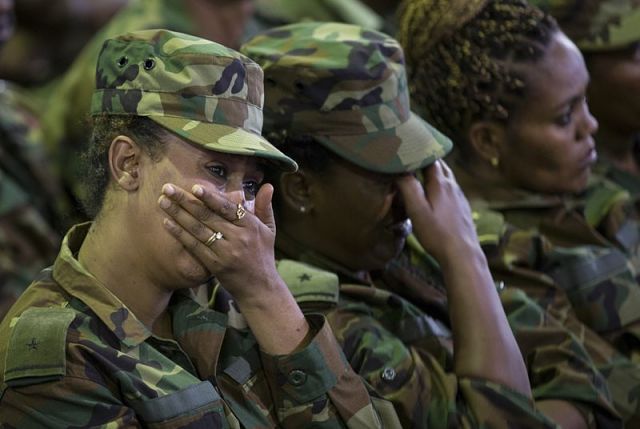
Members of the military shed a tear during a state ceremony for assassinated army chief Gen. Seare Mekonnen, at the Millennium Hall in the capital Addis Ababa Tuesday, June 25, 2019. (AP Photo/Mulugeta Ayene)
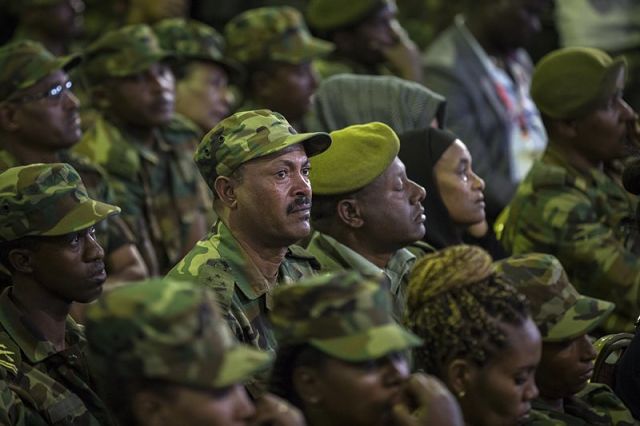
Members of the military shed a tear during a state ceremony for assassinated army chief Gen. Seare Mekonnen, at the Millennium Hall in the capital Addis Ababa Tuesday, June 25, 2019. (AP Photo/Mulugeta Ayene)
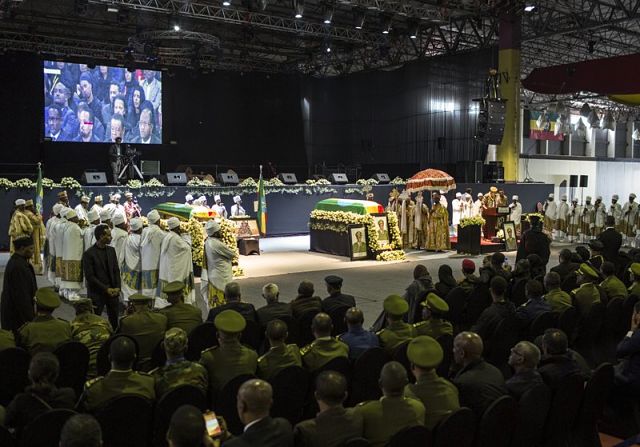
The coffin of assassinated army chief Gen. Seare Mekonnen rests in state during a state ceremony at the Millennium Hall in the capital Addis Ababa, Ethiopia Tuesday, June 25, 2019. Ethiopia’s Prime Minister Abiy Ahmed sobbed openly at the service Tuesday for the military chief who was assassinated by his own bodyguard over the weekend. (AP Photo/Mulugeta Ayene)
“The assassinations were a severe setback to Abiy and a wake-up call showing the fragility of his reform plans,” said Alex Vines, head of the Africa Program at Chatham House in London.
“Abiy has shown tremendous bravery in his reform agenda and in trying to dismantle the military and security regime that had run Ethiopia. These attacks show that some of those threatened by his reforms are striking back. The danger is that Abiy will respond to this by becoming more authoritarian himself.”
The weekend assassinations in Addis Ababa and Amhara were “a blow to Abiy’s democratization agenda and may well worsen Ethiopia’s political and security crisis if key issues are not urgently tackled,” said William Davison, senior analyst on Ethiopia for the International Crisis Group.
“Abiy’s challenges include divisions within the ruling EPRDF party that are exacerbated by opposition challengers, including strong ethno-nationalist movements,” said Davison. “The consequent dysfunction of an until recently all-powerful ruling coalition is reducing government effectiveness and contributing to the insecurity. Unless this situation improves, then it will be difficult to create a conducive environment for the planned competitive elections next year.”
—
Related:
UPDATE: Plotter of Failed Ethiopia Coup Killed, 182 Others Arrested
The PM’s spokeswoman gives details of army chief’s assassination
Watch: Government says rebellion quashed
Ethiopia says coup attempt thwarted, military chief killed (AP)
Ethiopia says coup attempt in Amhara region has failed (CNN)
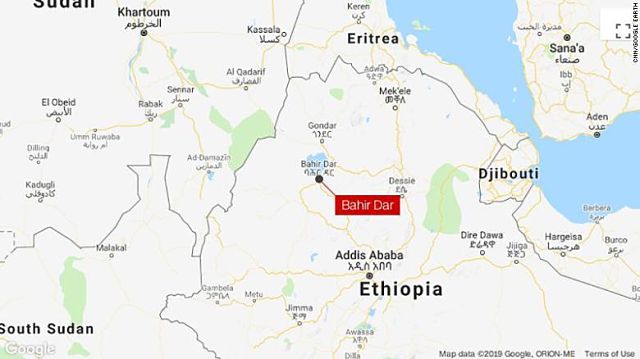
Officials say the coup attempt occurred in Bahir Dar in northern Ethiopia. (Google map)
Ethiopian officials say a coup attempt on Saturday against the Amhara regional government has failed.
“We confirm there has been a coup attempt against the leadership of the Amhara regional state,” said Ethiopian Press Secretary Negussu Tilahun.
He said the coup attempt in Bahir Dar, the regional capital, had failed.
Ethiopian Prime Minister Abiy Ahmed said in a tweet that federal police have been authorized to “take action on the instigators.”
It was not immediately known who was behind the failed coup.
Separately, the US Embassy in Addis Ababa issued a security alert saying it is aware of shots being fired in the capital, as well as violence in and around Bahir Dar.